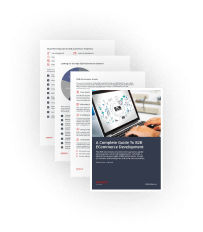The world’s largest eCommerce platforms are gradually learning to work with blockchain technologies. Some businesses accept cryptocurrency as a payment method, some use blockchain in logistics. Experts expect that modern technologies will change the daily life of consumers and sellers in the same way that eCommerce changed the traditional retail at one time. Let’s look at how the blockchain is changing the eCommerce environment and what hinders this development.
What is blockchain
Blockchain technology is a revolutionary advancement in the realm of digital transactions. A blockchain is a type of distributed ledger technology (DLT) that consists of a list of records securely linked with each other using cryptography. Each record includes a cryptographic hash of the previous record and transaction data. Blockchain transactions are irreversible. After recording data, nobody can change it without altering subsequent blocks. This is how blockchain ensures its immunity to hacking.
The blockchain technology suits eCommerce and ensures fair and transparent transactions with vendors, suppliers and customers.
Time of marketplaces
4 main platforms make 65% of all online retail purchases: Amazon, eBay, Alibaba, and Etsy. Reasons vary but the main one is the convenience of selling/buying on the marketplace.
The marketplace is an online platform that provides products and services where manufacturers and consumers benefit from online services:
- Customers can search for the desired features among a large number of vendors, study ratings, benefit from cashless payment and a payment protection system
- Vendors use ready-made technological solutions for creating an online store (micro store) without the cost of developing a website and mobile applications, as well as a payment infrastructure for settlements with customers.
The “marketplace” concept is a stage in eCommerce development at which software technologies and payment infrastructure are separated from sellers and buyers and supported by an independent person – the platform administrator.
Blockchain for marketplaces to increase trust
The marketplace monopolization led to the concentration of risks within the platform infrastructure. All the marketplace participants have to trust the marketplace administrator as all the operations happen within the platform only. These factors are especially relevant in the context of economic globalization and the growth of cross-border transactions, in which there are no mechanisms to ensure effective legal protection of the parties. Integrating blockchain in ecommerce could potentially address these concerns by providing a decentralized and transparent system for transactions and data management.
The use of distributed ledger technologies (DLT or blockchain) helps in solving a number of these problems and contributes to the marketplace optimization ensuring fair competition in the eCommerce segment.
Thus, the immutability of transactions in the blockchain guarantees the impossibility of modification or loss of data on user transactions by the platform administrator. Thanks to blockchain technology for ecommerce, all the marketplace participants can always receive up-to-date data on their operations which can be used to protect their rights and legitimate interests.
Having a validated and audited DLT system increases competition among marketplaces, as gives users a priori confidence in the marketplace infrastructure.
According to a study led by Deloitte in May 2014, reviews and ratings are the most requested information (81% of potential customers study reviews before making a purchase). The use of blockchain technologies makes it impossible to remove this information from blockchain ecommerce marketplaces, providing users with objective and transparent data about products and vendors.
DLT systems allow the use of tokenization tools and smart contracts for marketplace transactions and operations. Smart contracts offer a very cheap means of automating settlements in the process of online trading. This is especially true for cross-border transactions: a smart contract ensures that settlements are carried out according to predetermined milestones (for example, the receipt of goods by the buyer or the automatic calculation of penalties for delay), and can also serve as a mechanism for resolving disputes and rating the transaction participants.
Blockchain tokenization
The tokenization mechanism can be applied for crypto payments, recording the cost of mutual transactions and netting to reduce transaction costs.
At the same time, to ensure the security of settlements, both cryptocurrency and fiat (state) currencies can be reserved (for example, on escrow accounts or other specialized accounts of a custodian bank). The latter is especially relevant, because small and medium-sized businesses are completely unable to pay the cost of services of financial organizations to ensure cross-border payments (letters of credit and bank guarantees), and such a new type of payment can serve as a “digital letter of credit”. In this sense, with the help of the marketplace, these costs can be taken on a single occasion.
What is holding back progress?
It is obvious that blockchain technologies have great potential for marketplaces. However, it should be noted that there are a number of difficulties and limitations in this process.
Fiat currency
In some countries, legal entities and individual entrepreneurs can only accept fiat currencies as payment for products, works and services. This problem can be solved by using a special intermediary (agent) in the marketplace structure that pays the seller in the required currency and accepts cryptocurrency on its balance sheet for further sale.
Typically, such companies are registered in countries where crypto exchange is regulated, usually by licensing the relevant intermediaries. This approach also makes it possible to remove the difficulties with the calculation and payment of taxes by participants in transactions on the marketplace.
Blockchain smart contracts
Another problem is the concentration of risk in the marketplace infrastructure when storing funds for the implementation of “fiat” smart contracts. Since fiat money cannot be directly transferred to the blockchain, a trusted intermediary is needed that links the tokenized asset (stablecoin) and its collateral (fiat currencies). It is necessary that such an intermediary be a reliable custodian/escrow agent or other payment gateway. This helps to reduce the risks of non-payment, but does not completely eliminate them (as, in principle, it is impossible to completely eliminate the risk of bank failure in traditional banking operations).
State law
Another important issue is the restrictions imposed by the legislation on personal data when storing data on the identity of individuals. For example, one of the most stringent regulations in this area is the General Data Protection Regulation (GDPR), which came into force in the EU in May 2018.
This document establishes the so-called “right to be forgotten” as one of the fundamental rights of the individual, according to which the subject of personal data has the right to demand the removal of relevant data about himself from various data sources. Obviously, the blockchain technology does not provide for such a possibility, however, this does not mean that it is fundamentally impossible to use the blockchain to store the personal data of the marketplace user. To solve this problem, the marketplace operator will need to perform a number of manipulations: from the anonymization of personal data to the creation of special rules, policies and a protective data processing infrastructure.
As one solution, only hashes of personal data can be recorded in the blockchain together with an additional parameter that cannot be attributed to personal data on its own (for example, using only a hash and a mobile phone number). According to the GDPR, the principles of personal data protection do not apply to information about its owner if the information is presented in such a way that it is impossible to identify the subject of personal data. This approach is favorable in most jurisdictions, where mobile operators do not disclose the details of the owner of a phone number, except in special cases established by law.
Blockchain use cases and blockchain examples
As already mentioned, DLTs are not only able to “translate online” services that were previously missing on the web, but also to launch new sectors of the economy.
For example, a Ukrainian startup (Propy blockchain platform) offers users to rent, buy and sell real estate “online” using smart contracts. This exemplifies the potential of blockchain based ecommerce in revolutionizing traditional industries like real estate.
Singapore Power Group launched a marketplace for trading certificates for the use of renewable energy sources.
Simtech Development Blockchain use case
A year ago, a customer contacted us and asked to develop a system to simplify the legal processes associated with the registration of intellectual property rights. The difficulty was that the processes must be 100% digital while maintaining their legal force. To solve this problem, we opted for blockchain technology to provide the highest level of integrity and information protection.
Closing
Despite some problems and obstacles to implementation, the Blockchain potential for eCommerce businesses is obvious, and the need for their implementation in marketplaces is beyond doubt.

